SelfDefinition.Org
Afterlife Articles
Victor D. Solow
After-Death Experience
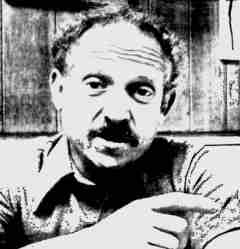
"Dead" for 23 Minutes, Man is Saved by Crews
by Victor Solow
Article Text
Note: This is one of various versions of Mr. Solo's story published in May-August 1974. It is longer, more detailed version of a nationally-syndicated AP story published a week earlier, on May 26, 1974, which can be seen Here. The entire four-part series is Here. This version ends rather suddenly, but at the bottom of this page some paragraphs are added from a longer version published June 6, 1974 in the Star Gazette/Sunday Telegram. The entire article was later re-written for Readers' Digest, published October, 1974, and at the end, several paragraphs were added by Mr. Solow on the nature of the transcendental after-death experience: I Died at 10:52 A.M.#transcendence. For more on the experience see: Dead Man Lives to Tell About It#the-other-dimension.
TODAY, Sunday, June 2, 1974, page 16A
"Dead" for 23 Minutes, Man Is Saved by Crews
By VICTOR SOLOW
Gannet News Services.
MAMARONECK, N Y.
It was 10:52 a.m. Saturday, March 23.
My wife, Lucy, and I had been jogging at the Rye Neck High School track in Mamaroneck and we were driving back to our house to join a weekend guest for a late breakfast. The conversation was ordinary, interspersed with conversation about our friend.
I was driving and had just stopped for a red light.
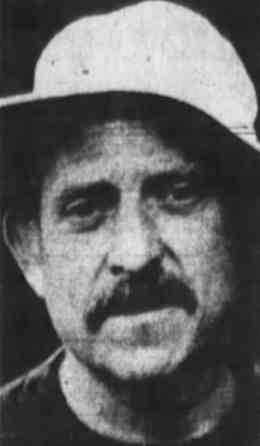
Victor Solow, 1974
Mrs. Solow: "Then calmly, but with great surprise, he turned toward me and said. 'Oh. Lucy, I ... '
"As swiftly as the expiration of a breath, he seemed to settle down in his seat with all his weight. Even his head remained almost erect but his eyes opened wide, like one utterly astonished about an unexpected, strange transcendence.
"But I knew instantly he could neither hear nor see me. I pulled on the emergency brake and turned off the ignition, incoherently talking and pleading with him to hang on, that he was going to be fine. He uttered not a sound.
"I ran out of the car toward the gas station, crying out that my husband was ill, ill, please help me, do something.
"By this time the light had changed and traffic was making graceful swings around the parked car. No one noticed me. I was simply an annoying obstacle.
"The station attendant looked nonplussed and impatient. He stared at me in disbelief that I had somehow interrupted his otherwise placid morning.
"Frantically, I rushed back into the car, torn between getting help and attending to my husband. By this time, his color had turned gray-green, his mouth hung open but his eyes seemingly continued to view an astounding scene.
"I dashed out again after frantically trying in vain to pull him to the other seat so I could drive him to the hospital. This time my shouts attracted Frank Colangelo from the station, who immediately told someone to phone the police.
It was 10:54 a.m.
"Then I realized I, myself, in my panic, had failed to follow a correct, sane procedure for emergency treatment, had forgotten all about police and ambulance. I was simply crying out for help."
[Victor resumes the narrative here.]
The call from Colangelo alerted police, but even before police radioed cruisers and the Mamaroneck Emergency Rescue Squad, the patrol car of Ptl. James Donnellan arrived. Donnellan stopped to investigate the car stopped in the middle of the road, recognized the gravity of my condition and removed me from the car with the help of the gas station manager. After checking for pulse and respiration, he immediately proceeded with heart massage.
Death: A Fact of Life
It was 10:55.
Patrolman Michael Sena arrived less than a minute after receiving the alert in his patrol car. He yanked oxygen tank and amu-bag (an artificial breathing device) from his car, connected the oxygen to the bag and put the mouthpiece over my face. Donnellan continued the heart massage.
Thirty seconds later, Tom McCann, a volunteer member of the Mamaroneck Fire Department Rescue Squad, trained as an emergency medical technician, arrived. He had been across the street for a fire inspection when his emergency radio beeper alerted him.
McCann: "Your eyes were open, your pupils dilated – a bad sign. You had no pulse. There was no breathing."
McCann, who weighs 270 pounds, took over the heart massage, and the two policemen tried to get a better seal on the mouthpiece of the amu-bag, which, because of my mustache, was something of a problem. McCann. noticing the difficulty, began mouth-to-mouth resuscitation while Sena and Donnellan took turns at heart massage.
It was 10:58 a.m.
The rescue squad ambulance arrived, manned by volunteers trained as emergency medical technicians or advanced first-aid technicians.
Without stopping the heart massage or artificial breathing therapy, they put me in the ambulance.
One of them had radioed United Hospital and told them he and his men were bringing in "a code" – a patient who was most likely dead and would require revival efforts. While the ambulance was speeding to United Hospital in Port Chester, five miles distant, the crew continued heart massage and artificial respiration.
It was 11.00.
United Hospital called Code 99 over its loud-speaker system. Within minutes the emergency room was staffed with two surgeons, two internists, two respiratory therapists, two technicians from the cardiology department and four nurses.
It was 11:09.
The ambulance arrived at the hospital.
Dr. Harold Roth: "The ambulance pulled up and the back door was opened. We could see the crew inside, administering cardiopulmonary resuscitation. They continued while they took him out of the ambulance.
"The patient was dead by available standards. In other words, there was no measurable pulse, no heart activity, he was not breathing and he appeared to have no vital signs whatever."
Cardiac massage and artificial respiration were maintained during transfer from ambulance to operating table. Then hospital doctors and technicians took over.
It was 11:10 a.m.
Surgeons, internists, respiratory technicians and nurses were working in unison. Within 10 seconds a cardiac monitor (which translates heart activity into visual terms) was attached. Simultaneously, a cut-down was done on my leg to find a vein to infuse medication directly into the circulatory system. A tube supplying pure oxygen was placed into my windpipe. Intravenous injections were started in both arms.
The monitor revealed no heart activity whatsoever. While heart massage was continued by hand, an electric shock apparatus had been attached to my chest.
It was 11:13 a.m.
The first electric shock was applied. It was powerful enough to lift my entire body inches off the operating table; an electrocution in reverse. But there was no result. The heart still showed no activity.
It was 11:14 a.m.
The massage and oxygenation were being continued; a second electric shock was applied An irregular rhythm began to show on the cardiac monitor.
Dr. Harold Roth: "At this time, examination revealed that the patient's pupils were constricted and narrow. Indicating there was a possibility of survival. The heart massage and artificial respiration started by the police and continued by the rescue squad had been effective In maintaining circulation and oxygenating the brain. After the second shock, we began to get evidence of a rhythm on the cardiac monitor.
It was 11:15 a.m.
"The patient was alive and we rapidly began to get Increasing movement. He became rousable. He was able to breathe, and we put him under nasal oxygen. From that point, we tended to stabilize him, giving whatever drugs were required, and monitoring the cardiogram to make sure the heart wouldn't stop again."
The crisis was over.
Half an hour later, I was taken to the coronary care unit, where cardiologist Dr. Roy Gumpel took over. He said the heart rhythm still was not ideal, and opted for a third electric shock, administered under anesthesia. The heart returned to a regular sinus, or normal rhythm.
For a disheartening time it appeared that the brain had been damaged. The hospital report reads: "Retrograde amnesia and difficulty with subsequent current events was recognized. This seemed to persist into the fourth and fifth day of hospitalization. The neurologist felt prognosis was rather guarded regarding future good judgment and ability to carry on with his previous work."
For my family, it was a period of dread, of hope. Would I be a vegetable for the rest of my days? On the sixth day, there was a miraculous change. The reality of my everyday world burst into every corner of the room, filling me with confidence and joy.
And, when I beat my friend in two chess games and he remarked with some annoyance, "Obviously, there's nothing the matter with your damn head," I felt I had been decorated with the Distinguished Service Cross.
I was discharged from the hospital April 5, two weeks after the incident. As someone remarked later, it took him longer to get over the flu. The only tangible, though painful, proof I had not been the victim of my own fantasies was four broken and two cracked ribs sustained as a result of Tom McCann's 270-pound strict attention to duty. His heart massage is heartwarmingly enthusiastic and efficient and you "can't live without it."
I felt compelled to understand the exact mechanics of what had occurred.
Dr. Roth was informative: "You know, there's no sense mincing words about this. Essentially, you were dead on arrival at the hospital. If all the things weren't available at the hospital and with the trained emergency crews working on you till you got to the hospital, jou would simply just be another dead person."
Additional Paragraphs, Sunday Telegram
Also indexed in Newspapers.Com as Star Gazette.
SUNDAY TELEGRAM. Elmira. N.Y.. June J. 1971 3C
Writer escapes death's grasp after brief encounter
(Continued from Page 1C.) [duplicated paragraphs omitted]
[Dr. Roth still speaking ...]
"Five days later, another victim was brought in. A similar event had happened in Port-Chester – a man 'dropped dead' and an ambulance crew picked him up and massaged him all the way to the hospital. In the emergency room he, too, was revived. So that's two people in one week who certainly would no longer be around had these trained volunteers not been available.
"Throughout the United States, we estimate that about one-third of the people who die before or upon arrival at the hospital can be saved by the use of this kind of training."
Like most people. I always have thought the purpose, of an ambulance was to Transport a victim to the hospital at maximum speed, where the necessary treatment would be administered by doctors.
Now I understand that a whole new concept is involved – not speed of patient transport, but immediacy of trained help. If circulation has stopped in an accident victim and is not restored quickly, irreversible brain damage will occur, within four to six minutes.
If Mamaroneck patrolmen James Donnellan and Michael Sena had not acted at once, if their heart massage and artificial respiration had not been skillfully continued by the trained members of the rescue squad, no ambulance could have reached the hospital in time for me. regardless of speed. Neither would the most brilliant doctors nor the most advanced hospital equipment have been of any use.
The earlier the treatment, the greater the expectation of positive results. In my case it was literally a matter of life or death.
Article Images


Column 1
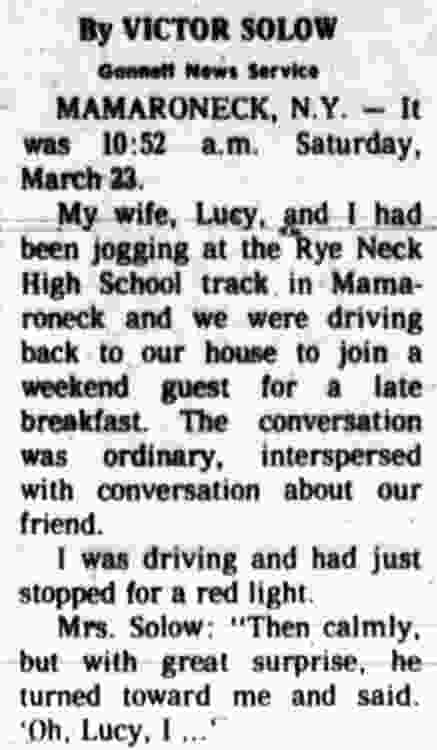
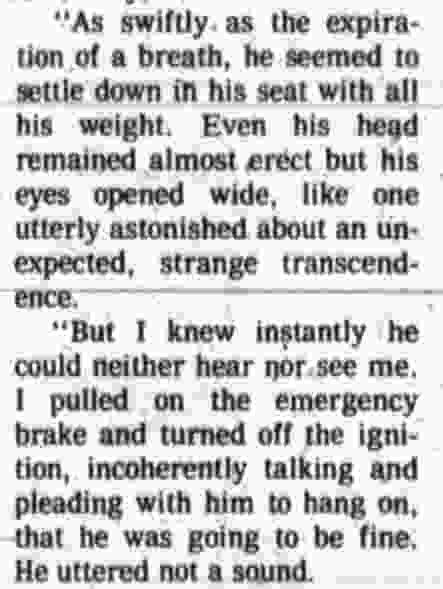
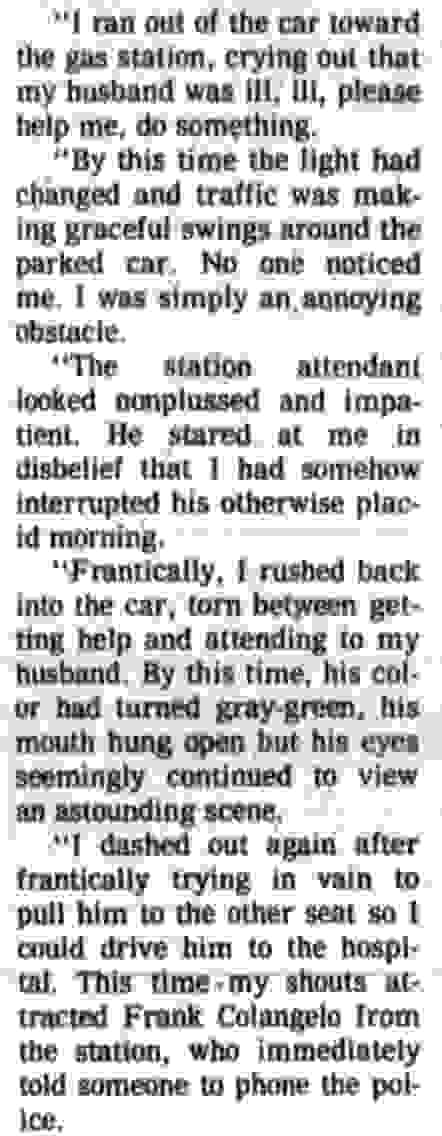
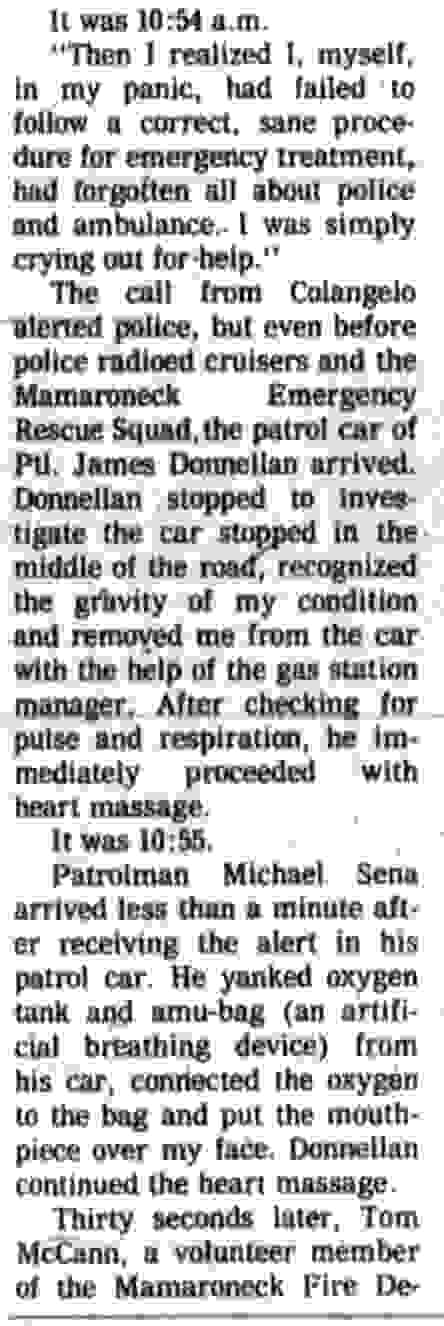
Column 2
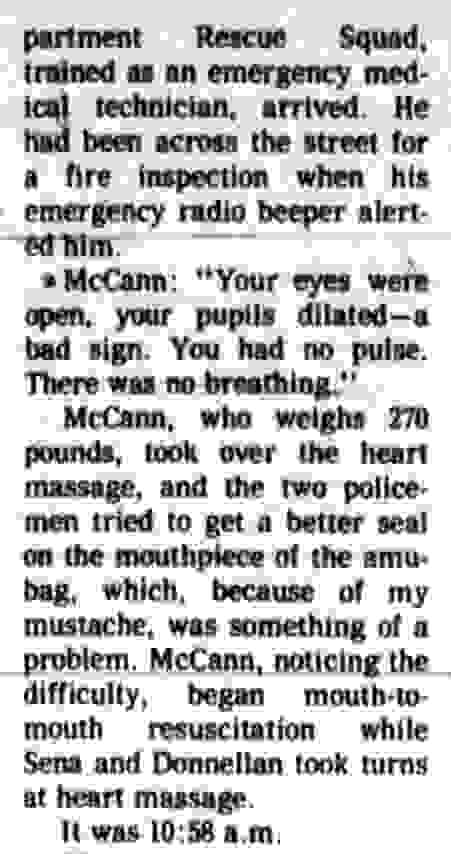

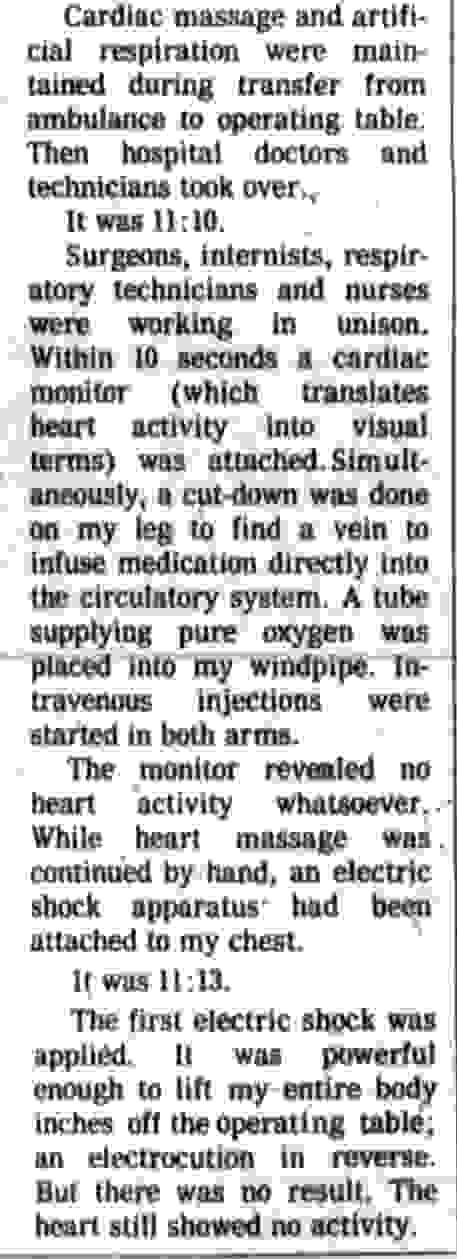
Column 3, 4, 5
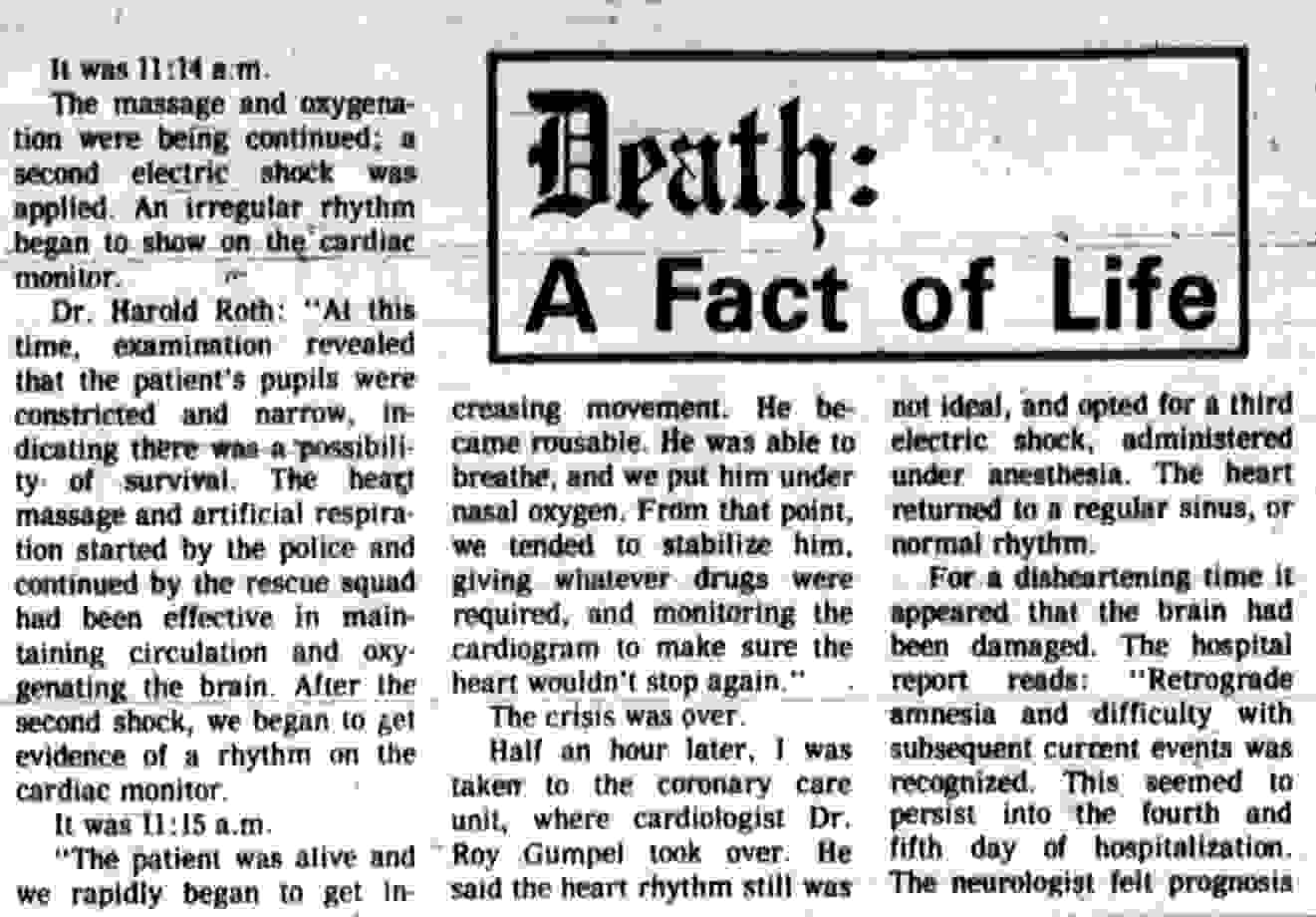
Column 6, 7 and image
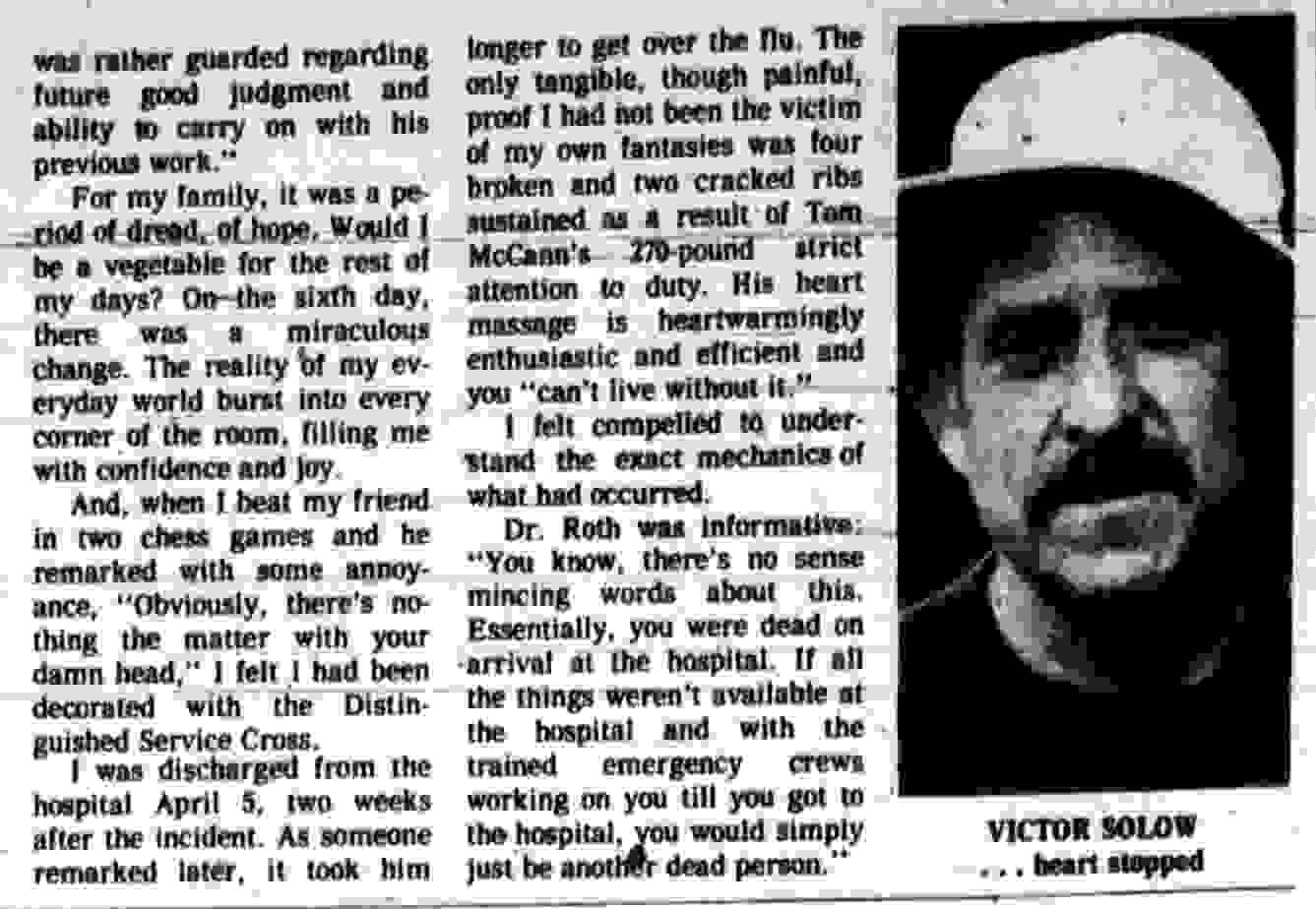
Additional Paragraphs, Sunday Telegram, June 9, 1974

Page 2, Column 1, 2, 3

Page 2, Column 4, 5, 6

Links to images full size: images-florida-sun/
Touch Back button to return.
Related articles in this section: